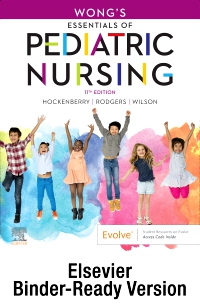
Wong's Essentials of Pediatric Nursing - Binder Ready, 11th Edition
Binder Ready

Now $87.99
**Selected for Doody’s Core Titles® 2024 with "Essential Purchase" designation in Pediatrics**
As the #1 title in the pediatric nursing market for over 40 years, Wong's Essentials of Pediatric Nursing, 11th Edition continues to leverage its trademark developmental approach as it equips readers with the very latest research and guidelines for treating children today. The text utilizes a highly-readable writing style and encourages a whole-body approach — beginning with child development and health promotion to better understand the later chapters on specific health problems. This new eleventh edition also features Next Generation NCLEX®-style case studies and questions, a new chapter covering all systems cancers, additional case studies within the nursing care plans, and updated and expanded evidence-based content throughout to best reflect the latest standards and trends impacting pediatric nursing care today.
-
- Developmental approach clearly identifies developmental tasks and influences at each stage of a child’s growth
- Emphasis on wellness features health promotion chapters for each developmental stage of childhood
- Critical thinking case studies with answers are found throughout the text
- Quality patient outcomes are highlighted within nursing management discussions for major diseases and disorders
- Drug alerts draw attention to potential safety issues, reflecting QSEN safety initiative
- Family focus includes a separate family chapter as well as family content and Family-Centered Care boxes integrated throughout the text
- Community Focus boxes provide resources and guidance on caring for children outside the clinical setting
- Evidence-Based Practice boxes focus attention on the application of research and critical thought processes to support and guide the outcomes of nursing care
- Chapter on complementary & alternative therapy cover timely topics to aid in providing complete, comprehensive care
- Nursing care plans provide a model for planning patient care and include rationales that provide the "why."
- Research Focus boxes highlight current studies that impact pediatric nursing today
- Cultural content and Cultural Considerations boxes are integrated throughout the text to draw attention to customs and beliefs of different cultures that influence childcare
- Atraumatic Care boxes contain techniques for care that minimize pain, discomfort, or stress
- Nursing tips offer helpful hints and practical, clinical information of a non-emergency nature
- Nursing alerts feature critical information that MUST BE considered in providing care
- Emergency Treatment sections provide a quick reference in critical situations
- Nursing care guidelines provide clear, step-by-step instructions for performing specific skills or procedures
-
- NEW! Next Generation NCLEX®-style case studies and questions are included in the text and on the companion Evolve website
- NEW! Pediatric Quality Indicator boxes present a bigger picture of hospitals and how they look at quality and safety
- NEW! Applying Evidence to Practice boxes outline up-to-date procedures to reinforce best practices
- NEW! Concept lists have been added to the beginning of chapters to aid programs using a concept-based curriculum
- NEW! Separate chapter on cancer focuses on best-practices within this specialized area of pediatric care
- NEW! Expanded information on the Zika virus ensures you are grounded in the latest evidence-based information
- NEW! Updated genetics content keeps you up to date in this always evolving area of medicine
- NEW! Expanded content on the different roles in pediatric nursing reflect nursing responsibilities and the most common pediatric nursing subsets utilized in practice today
- UPDATED! Content on autism spectrum disorders has been updated to keep you in the know on the latest practice standards used in this rapidly expanding area of pediatric care
- NEW! Information on Narcan reinforces how to properly apply the injection
- UPDATED! Translating Evidence into Practice boxes have been updated to focus attention on application of both research and critical thought processes to support and guide the outcomes of nursing care
-
1. Perspectives of Pediatric Nursing
2. Family, Social, Cultural, and Religious Influences on Child Health Promotion
3. Developmental and Genetic Influences on Child Health Promotion
4. Communication and Physical Assessment of the Child and Family, Nutrition Section
5. Pain Assessment in Children
6. Childhood Communicable and Infectious Diseases
7. Health Promotion of the Newborn and Family
8. Health Problems of Newborns
9. Health Promotion of the Infant and Family
10. Health Problems of Infants
11. Health Promotion of the Toddler and Family
12. Health Promotion of the Preschooler and Family
13. Health Problems of Toddlers and Preschoolers
14. Health Promotion of the School Age Child and Family
15. Health Promotion of the Adolescent and Family
16. Health Problems of School Age Children and Adolescents
17. Impact of Chronic Illness, Disability, or End-of-Life Care for the Child and Family
18. Impact of Cognitive or Sensory Impairment on the Child and Family
19. Family-Centered Care of the Child During Illness and Hospitalization
20. Pediatric Nursing Interventions and Skills
21. The Child with Respiratory Dysfunction
22. The Child with Gastrointestinal Dysfunction
23. The Child with Cardiovascular Dysfunction
24. The Child with Hematologic or Immunologic Dysfunction
25. The Child with Cancer
26. The Child with Genitourinary Dysfunction
27. The Child with Cerebral Dysfunction
28. The Child with Endocrine Dysfunction
29. The Child with Musculoskeletal or Articular Dysfunction
30. The Child with Neuromuscular or Muscular Dysfunction
31. The Child with Integumentary Dysfunction







 as described in our
as described in our 